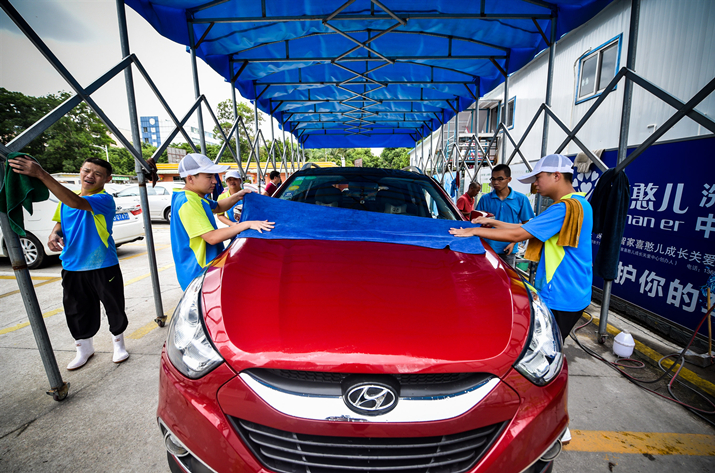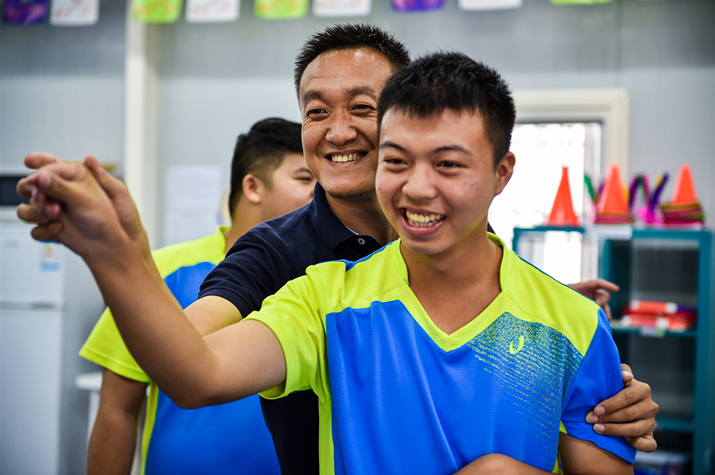|
||||||||||
| Home Nation World Business Opinion Lifestyle ChinAfrica Multimedia Columnists Documents Special Reports |
|
||||||||||
| Home Nation World Business Opinion Lifestyle ChinAfrica Multimedia Columnists Documents Special Reports |
| ChinAfrica |
| Working for Respect |
| A father in Shenzhen uses his business acumen to help his son and other children with intellectual disabilities |
| By Li Xiaoyu | VOL.12 March ·2020-03-24 |

Workers at the Xihan'er Car Wash Center in the Futian District of Shenzhen, south China's Guangdong Province, clean a car on August 13, 2015 (XINHUA)
A dusty car enters a car wash and, just half an hour later, comes out squeaky clean. Normally there is nothing surprising in it, but customers are often speechless when they learn that this professional-grade washing service is handled by young people with intellectual disabilities.
Indeed, the 16 staff at the car wash, named Xihan’er Car Wash Center in the Futian District of Shenzhen, south China’s Guangdong Province, are all young people aged 16 to 25 living with intellectual disabilities, such as cerebral palsy, Down’s syndrome or autism. The term xihan’er is a friendly name in Chinese language for this group of people.
Opened in August 2015, the car wash center is now financially viable. It has been chosen as an example to be followed by the China Disabled Persons’ Federation, which has replicated the car wash model in 16 provinces across the country so far.
“Providing employment in a real work environment is more conducive to the development of people living with intellectual disabilities,” said Zhang Baolin, former Director of the China Association of Persons with Intellectual Disability and their Relatives (CAPIDR).
For a safe future
Statistics show that China is home to an estimated 12 million families with children diagnosed with mental or neurological disorders. Among the people living with disabilities, those with intellectual disabilities experience the greatest difficulty in finding a job, with an employment rate of less than 10 percent. The majority will depend financially on their parents for their entire life. How to integrate them into the society therefore remains a major challenge.
Cao Jun, founder of Xihan’er Car Wash Center, is the father of a child facing this challenge. His son was diagnosed with a mild intellectual disability when he was only a few months old. Since then, he has been haunted by questions about the future of his child, especially when his parents can no longer be by his side. Who will take care of him? Clearly, this was a problem money could not solve.
His anxiety quickly drove him to take action. He gave up his work in the investment business and set out to explore solutions around the world for a year and a half. Cao found that traditional methods of support, such as the job of folding paper bags, are often born out of sympathy, regardless of actual market demand. “Relying only on kindness doesn’t work,” he said. An in-depth analysis of different solutions finally led him to car washing.
Indeed, contrary to other types of handicap, people living with neurological disorders mostly struggle with a mental deficiency, but their physical capacity is not affected. This makes them particularly suitable for a job like washing cars, which requires a good physical condition. His plan was well received by other parents in a similar situation. In 2015, they jointly created the car washing center through crowdfunding and registered it with the local office.

Cao Jun, founder of Xihan'er Car Wash Center, plays darts with a worker of the car wash on August 13, 2015 (XINHUA)
Equal treatment
Cao simplified the car washing process and divided the work by taking into account the characteristics of each child. “Children with a mild mental disorder account for only five percent of the group. So we have to make sure that everyone is able to make their own contribution,” he said.
For him, whatever their position, they all put in the same efforts. Everyone is therefore paid the same salary. The day they receive their monthly salary of more than 2,000 yuan ($286) is the happiest time of the month for them. They can finally live on their own and earn their daily bread like their peers.
In addition to completing their daily task, staff at the car washing center also receive help from two special education teachers, who provide tips and lessons to better adapt to social life. In the beginning, the staff were accompanied to work by their parents. As they became more experienced, they began to take public transport, and even shared bikes.
In the first days of the opening of the center, some customers wanted to pay more. But every time, Cao insisted to give back the extra money, arguing that this approach was not commercially sustainable. Nor did he want to “kidnap” customers of his competitors by appealing to their emotions. “What we’re really looking for is to get customer recognition through our quality service,” he said.
One day when a customer came to inquire about the discount on waxing, Cao was so moved that he decided to offer the wax free of charge. “This meant that the client was ready to overlook the intellectual disorders of these children and treat them as equals. This is the greatest sign of respect for us,” he explained.
Long way to go
More than four years after having opened its doors, the car wash center continues to gain popularity, not only among clients but also among parents who would like to see their children work there.
Among the many candidates is Zhong Xinlai, from northwest China’s Gansu Province. Suffering from cerebral palsy, he had resigned himself to staying at home. When he saw a piece of news about the car wash, he regained both hope and enthusiasm: “Mom, I can do this job!” Four years ago, he met Cao alone, after having traveled for more than 50 hours by train. Thanks to his new work, he now feels much better, but since Shenzhen is far from his hometown, he can only return home once a year.
“Car washing services often have a limited reach. Our clients are generally made up of neighboring residents,” said Cao. “If each neighborhood has its own car wash, this could provide jobs for young people like my son, while allowing them to work near their home.”
Outside of Shenzhen, there are now 16 other Xihan’er Car Wash centers across the country. As a result, more and more young people like Zhong no longer have to travel far away to find a job. But that is far from enough for Cao.
According to him, the main obstacles ahead now lie in the high operating costs, such as staff salaries, rents and payments for teachers. As early as 2016, the China Disabled Persons’ Federation issued a notice on the development of employment support for people living with disabilities. Cao is now calling for more of this kind of support to make it easier to replicate his solution elsewhere.
(Comments to lixiaoyu@chinafrica.cn)
|
||||||||||||
| About Us | Contact Us | Advertise with Us | Subscribe |
| Copyright Beijing Review All rights reserved 京ICP备08005356号-5 京公网安备110102005860号 |